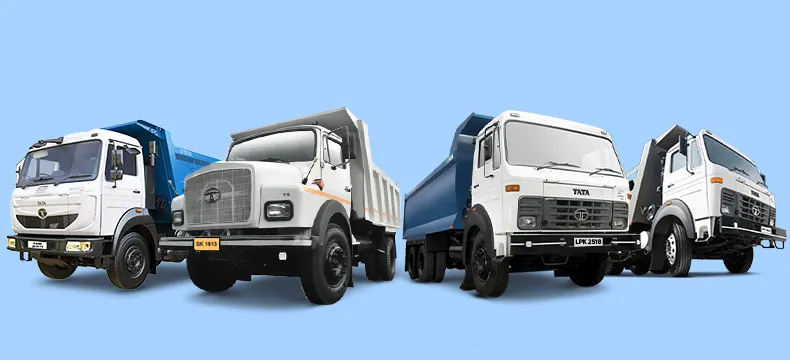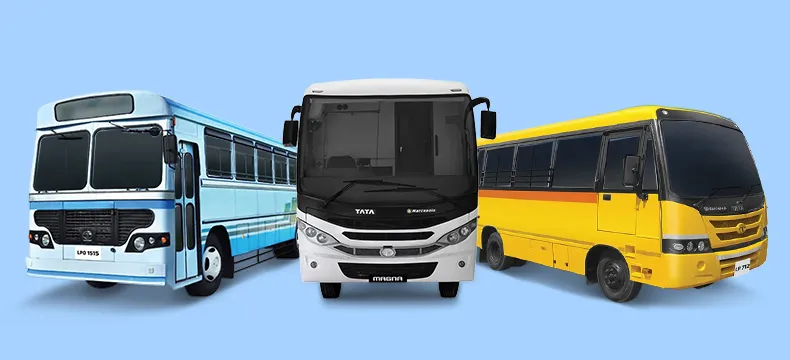17 Sep 2025

The Toughest Roads in Nepal for Truck Driving
- Tata Motors
- 13 Nov 2024
- COMMERCIAL VEHICLE
Introduction
While Nepal's landscapes are renowned for their beauty, these scenic routes can be treacherous for truck drivers. The toughest roads in Nepal for truck driving often feature steep inclines, treacherous curves, and poor maintenance, making them a formidable challenge. Understanding these roads and the hazards of the Monsoon season is crucial for truck drivers, as it helps them better prepare for the journey ahead.
Road Surface Conditions & Weather Conditions
Nepal's roads are notorious for their poor surface conditions, ranging from gravel and mud to sharp rocks. During the monsoon season, these roads become even more hazardous, with frequent landslides and flooding making them almost impassable. This is where the critical skill of truck handling on muddy roads comes into play for drivers navigating these challenging terrains.
Traffic Laws and Regulations Pertinent to Truck Drivers
Nepal's traffic laws are strict, especially on high-risk routes. For instance, night driving is often prohibited on roads like the Karnali Highway due to the high number of fatal accidents. These regulations, including specific load limits and vehicle maintenance standards, are not just rules but lifelines for truck drivers. Adhering to these rules is crucial for reducing risks on dangerous roads in Nepal for truck driving. Besides the Karnali Highway, the other roads that are considered dangerous include, but don’t amount to:
-
National Highway 318
-
Simbhanjyang Pass
-
Beni-Jomsom Road
-
Rudrabeni-Ridi Road
-
Jauljibi-Madkote Road
-
Kora La Pass
-
Nyi La Pass
-
Jumla Airport Road
-
Thorong La Pass
Poor Truck Maintenance
Proper truck maintenance is not just a task but a responsibility that can prevent catastrophic failures on the most challenging roads in Nepal for truck driving. Regular checks on brakes, tyres, and suspension systems are essential. In addition, ensuring that the engine is in good working order and that all fluids are topped up can help mitigate some of the inherent dangers of Nepal's challenging road conditions. Drivers should also be proficient in hillside truck driving techniques to control their vehicles on steep and uneven surfaces.
Safety Measures for Challenging Roads
Navigating the dangerous roads of Nepal for truck driving requires a range of safety measures. These include installing proper lighting and reflective markers on trucks, using advanced braking systems, and equipping vehicles with high-traction tyres suited for diverse conditions. Drivers are also encouraged to undergo training in defensive driving and hillside truck driving techniques to better handle sharp turns and steep inclines.
Tata Motors Vehicles for Nepal’s Tough Roads
Tata Motors offers a range of heavy-duty vehicles specifically designed to conquer Nepal's challenging terrains. Key models like the SK 1613, LPK 2518, LPK 2523, and Signa 2823.K are built for performance, durability, and safety, making them ideal for the demanding driving conditions found in Nepal, such as steep gradients, rugged routes, and muddy paths.
SK 1613
Equipped with a Cummins 6BTAA 5.9 engine, the Tata SK 1613 delivers optimised fuel economy and low maintenance costs, offering a reliable solution for transporting heavy loads with ease.
LPK 2518
Featuring a powerful Cummins B5.9 engine and a robust chassis, the Tata LPK 2518 excels in heavy-duty operations with a gradeability of 27%, making it perfect for construction and mining applications.
LPK 2523
This model boasts a high-capacity Cummins B5.9 engine and a Tata G1150 9-speed gearbox, providing superior engine life and ease of reparability. Tata LPK 2523’s high torque and reinforced axles ensure excellent performance on Nepal's toughest roads.
Signa 2823.K
With a strong Cummins ISB5.9 engine and a gradeability of 42%, the Tata Signa 2823.K is designed for high performance in steep and challenging conditions. Its advanced braking system and world-class Signa cabin provide enhanced safety and comfort for drivers.
Conclusion
Driving on Nepal's roads is not for the faint-hearted. From steep mountain passes to muddy trails, the challenges are numerous. However, with the right vehicle and proper preparation, even the dangerous roads in Nepal for truck driving can be managed safely. Tata Motors' lineup of durable and safety-focused trucks provides the necessary tools to conquer these daunting routes.
FAQs
What are the most dangerous roads in Nepal for truck driving?
Some of the most dangerous roads include the Karnali Highway, National Highway 318, and the Simbhanjyang Pass. Steep inclines, narrow passages, and frequent landslides characterise these roads.
What are the common challenges faced by truck drivers on these tough roads?
Truck drivers in Nepal face challenges such as poor road maintenance, severe weather conditions, and the need for specialised driving techniques to handle steep and slippery roads.
How can truck drivers prepare for driving on difficult roads?
Before setting out, drivers should ensure their vehicles are well-maintained, undergo training in defensive and hillside driving techniques, and stay informed about weather and road conditions.
- Tags
Latest Blogs


10 Sep 2025
What Exactly Is Torque in A Truck Engine?

10 Sep 2025


















